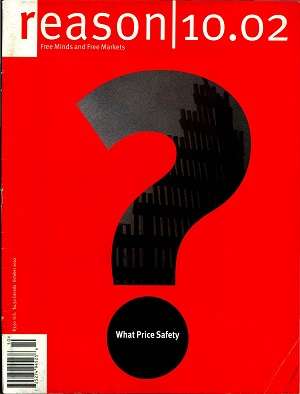Most of the Lessons of 9/11 Went Unlearned
There has been a tremendous residual cost in freedom and in dollars to secure an elusive security.

"American citizens cannot delegate the responsibility for strengthening our security, in our airports and on our streets, to bureaucrats. We should undertake a vigorous dialogue on the national cost of pretending we have limitless freedom in our world."
You'd find that quote near the end of a very long piece I wrote for the Austin American-Statesman in the aftermath of 9/11, 16 years ago. But newspapers didn't do as much internet archiving then as they do now, so I can't direct you to it. It was part of a cover story for an extra, something newspapers don't do much of any more either.
I get the paper version out on the anniversary—not every year—to admire its crystalline prose (I'm keeping in mind you can't look it up) and to take stock of a few prescriptions I was willing to make on deadline, fresh off that harrowing Tuesday.
Like many of us watching something truly horrendous happen on our home soil, I got a lot of things wrong. Like Hurricanes Harvey and Irma, 9/11 brought out what we like to think is the best in the American spirit. But I think Ben Domenech, the publisher of The Federalist, was right when he wrote a couple of anniversaries ago that "We wept and we forgot."
September 11, I wrote, stripped from Americans "the illusion that the Unites States could bestride the world with its economic and political power and somehow not be of the world." This was a new kind of Pearl Harbor, an attack with a potentially transformative power to unite Americans. Vietnam divided and continues to divide a country. After 9/11, I supposed, how could anyone disagree about the enemy and what needed to be done?
NATO seemed to prove my point. Although it has long been forgotten, for the first time in the treaty's history NATO invoked Article 5, asserting that an attack on the US was an attack on all member countries. Even Russia pledged to join this war on terrorism. "The opportunity exists for this war to unify the democratic world," I wrote, "in a way that World War II did not."
Oh, my. That's a little embarrassing. The US has since lurched from President Bush's war in Iraq to President Obama's unilateral interventionism to President Trump's selective brinksmanship. The Reason archives are bursting with hundreds of dispatches detailing the spectacular failures of American foreign policy, both on their own merits and as an international democratic unifier.
In 2015, Matt Welch wrote an article that serves as a chastener for my unjustified optimism. "What would happen in a world where humans, including those in or near power, freely admitted that they don't know how to stop ISIS, can't tell the difference between a Yazidi and and Assyrian, have no convincing explanation for why crime stats are fluctuating this year, and don't know why Billy Beane's shit doesn't work in the playoffs?" he asked.
"For one, I think people would be a little less likely to champion or sign up for giant, mass-mobilizing schemes. If we are humble in the face of facts, and mindful of the unforeseen consequences that come with every grand plan, we might be more cautious about bending a sprawling nation's resources and will in one direction or another."
At least I didn't lose my mind on the home front. Politicians at the time indignantly insisted that freedom and security are American birthrights. That entitled mentality obscured one of the central concerns of my essay: I was pretty sure Americans would be asked (or told) to pay for security with their freedom.
And as James Bovard concluded in the June 2016 issue of Reason, we've been paying ever since, in freedom and in dollars, for something we've never secured. Few publications have been as vigilant as Reason in resisting those exorbitant and unreasonable costs.
Which brings me to that opening quote, and to the vigorous dialogue that took place on this website and in our magazine but was in no way a national discussion. In Texas and now in Florida, we've seen again that Americans are good people, maybe even great. But if 9/11 showed us anything, it's how tough it is to sustain our goodness when there isn't a disaster.


Show Comments (26)